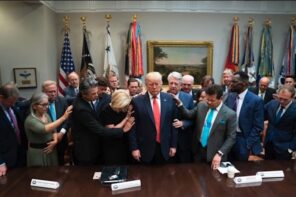Governor Mitt Romney heads to Great Britain, Poland, and Israel this week for his summer foreign policy tour. His itinerary—no Asia, no Middle East—is designed to convey an air of statesmanship and court key demographics (Israel for Jews and evangelical Christians, Poland for some Catholics) without putting Romney in places where his foreign policy positions, especially his opposition to a timetable for withdrawal from Afghanistan, run counter to the sensibilities of most Americans.
Romney observers have sometimes tried to sniff out ties between fringe elements of Mormonism and his foreign policy, but to review his foreign policy is to find religion conspicuous in its absence.
After all, his unapologetically exceptionalist outlook on the role of America in the twenty-first century world could be tied to Mormon teachings about America’s sacred significance as the setting for the Book of Mormon and the founding of the LDS faith, but it’s just as much redolent of Ronald Reagan, the former president to whom Romney would most like to be compared.
So too are his views on military spending and his naming Russia as our “number-one geopolitical foe,” often described as Reagan Cold War “throwbacks.” And speaking of throwbacks, as Congressman Adam Smith noted last week in Foreign Policy, 17 out of 24 of Romney’s campaign foreign policy advisors (including the bellicose John Bolton) served in the neoconservative Bush-Cheney administration.
Is Romney a neoconservative by conviction? Michelle Goldberg, Sarah Posner, and others have convincingly linked neoconservatism to a Christian dominionist worldview. It’s a worldview that might have harmonized with Cold War-era Ezra-Taft-Benson Mormonism but that seems out of step with contemporary Mormonism’s aggressively globalizing outlook.
I believe Romney’s neoconservativism is more a relationship of convenience than an article of faith. It saves him, at least, from having to articulate a post-Bush conservative foreign policy vision, as some have asked him to do. But he’s a pragmatist not a visionary, and in this his foreign policy resembles his economic policy: it’s designed in its public presentation to appeal to key voting demographics, but essentially values-neutral and centered on defending and promoting the interests of large institutions that reward loyalty.
We’ve seen this institutional loyalty-centered approach to foreign policy from LDS people in decision-making positions before. It was Jay Bybee (a lifelong Mormon and returned Mormon missionary who served in Chile during the Pinochet coup) who supervised and signed the 2002 “Torture Memos” effectively authorizing the United States’ use of “enhanced interrogation techniques” in Iraq. Allegiance to the chain of command trumps broadly humane ideals. That’s a disposition I believe reflects late twentieth century institutional Mormonism, as I’ve argued elsewhere.
So, on the matter of foreign policy, it’s worth noting that the most religiously devout candidate in recent memory maintains an approach to foreign policy shaped far more by nationalism and political expedience than by faith.




